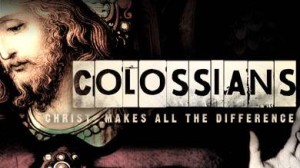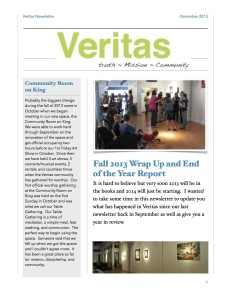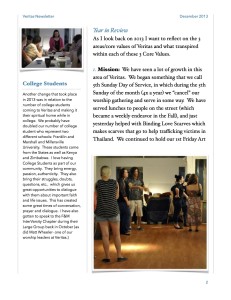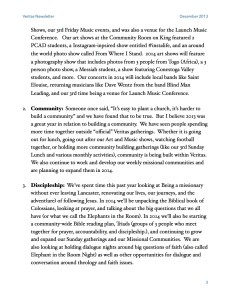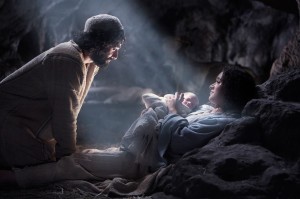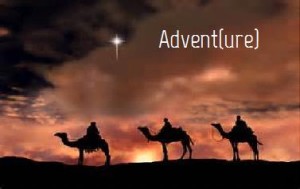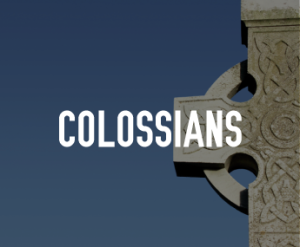 Over the last few weeks during our Colossians Remixed series we have been talking a great deal about 2 things. First, we have been talking a great deal about the supremacy and preeminence of Jesus over all other lords, including Caesar (who was called lord, savior, son of god, redeemer and liberator). And even today Jesus is Lord over all the other Caesar’s and lords that we run into. Over all the other things that we tend to put above Jesus. Jesus is Lord and the Caesar’s in this world are not and are at best a cheap knock-off. We talked about the fact last week that these lords, if you will, won’t lead to true freedom and liberation but to captivity and bondage.
Over the last few weeks during our Colossians Remixed series we have been talking a great deal about 2 things. First, we have been talking a great deal about the supremacy and preeminence of Jesus over all other lords, including Caesar (who was called lord, savior, son of god, redeemer and liberator). And even today Jesus is Lord over all the other Caesar’s and lords that we run into. Over all the other things that we tend to put above Jesus. Jesus is Lord and the Caesar’s in this world are not and are at best a cheap knock-off. We talked about the fact last week that these lords, if you will, won’t lead to true freedom and liberation but to captivity and bondage.
Secondly, if the other lords can only promise and never deliver true freedom and liberation, only Jesus and the gospel of the Kingdom of God can promise and deliver. Jesus the gospel of the Kingdom delivers true freedom and true liberation. We have spent almost each and every week also talking about the true nature of the gospel and what it encompasses. And how the gospel of Jesus and the Kingdom of God applied to the situation in which this young church in Colossae in the midst of the Roman Empire found itself. It found itself challenged by the images of Caesar that touted that Caesar was lord, savior, redeemer, and King. It found itself challenged by jewish religious leaders who were encouraging what we called last week Jesus +. Jesus + circumcision. Jesus + special knowledge. Jesus + following these rules and regulations (what you can’t eat, what you can’t touch, what you can’t handle). Jesus +.
So with those 2 important, overarching themes found within the New Testament book of Colossians laid out, we now turn to Colossians 3:1-17 and Paul begins to put flesh and blood on the bones. Starting to work out on the ground what it looks like to give supremacy and preeminence to Jesus and to live out the gospel of Jesus and the Kingdom of God. Let’s keep these 2 themes in mind as we read the Scripture, and unpack it together.
Colossians 3:1-17 says, “Since, then, you have been raised with Christ, set your hearts on things above, where Christ is, seated at the right hand of God. Set your minds on things above, not on earthly things. For you died, and your life is now hidden with Christ in God. When Christ, who is your life, appears, then you also will appear with him in glory. Put to death, therefore, whatever belongs to your earthly nature: sexual immorality, impurity, lust, evil desires and greed, which is idolatry. Because of these, the wrath of God is coming. You used to walk in these ways, in the life you once lived. But now you must also rid yourselves of all such things as these: anger, rage, malice, slander, and filthy language from your lips. Do not lie to each other, since you have taken off your old self with its practices and have put on the new self, which is being renewed in knowledge in the image of its Creator. Here there is no Gentile or Jew, circumcised or uncircumcised, barbarian, Scythian, slave or free, but Christ is all, and is in all. Therefore, as God’s chosen people, holy and dearly loved, clothe yourselves with compassion, kindness, humility, gentleness and patience. Bear with each other and forgive one another if any of you has a grievance against someone. Forgive as the Lord forgave you. And over all these virtues put on love, which binds them all together in perfect unity. Let the peace of Christ rule in your hearts, since as members of one body you were called to peace. And be thankful. Let the message of Christ dwell among you richly as you teach and admonish one another with all wisdom through psalms, hymns, and songs from the Spirit, singing to God with gratitude in your hearts. And whatever you do, whether in word or deed, do it all in the name of the Lord Jesus, giving thanks to God the Father through him.”
One of the things Paul longs for for the Colossian believers (and also all who would come after them) is that they (and us) would realize what is already true- in Christ. Because the Messiah and his people are so closely bounded up with one another, what is true of Jesus is also true of them (and us). So what is true of Jesus? That he died and rose again. What is then true of the followers of Jesus in Colossae? That they have died with the Messiah, that they don’t belong to the old world any more, and the regulations (found in Colossians 2) aren’t relevant anymore. And that they were raised with the Messiah, so that they possess a true life in God’s new world, also known as the ‘upper’ or ‘heavenly realm’ And if those things are true of the followers of Jesus in Colossae, than they are also true of you today if you are a follower of Jesus.
And when we have died with Christ, and risen with him to new life, we are called to, as Paul puts it, “set your hearts on things above, where Christ is, seated at the right hand of God. Set your minds on things above, not on earthly things.” Now does this mean only think about “heaven” and going there when you die. Or as the old adage states, “being so heavenly minded that they aren’t any earthly good.” Paul isn’t talking about the idea of thinking and setting our minds on “heaven” but on thinking and setting your mind on the things of the Kingdom of God and not on the things of the Kingdom of this world. In fact God through Paul is calling us to learn to think about things that are above, not the things that belong to this present world of change and decay. In fact, learning to think, rather than merely going with the flow of the world on the one hand or blindly obeying what looks like stringent regulations on the other, is part of the key to living out the gospel of the Kingdom of God here and now.
All too often in our world today the view of Christians are that they are unintelligent, weary of education (ever hear someone warn you of education because it might lead you away from the faith?), and seemingly calling people to leave their brain at the door. One book that I have on my shelf deals with this struggle. It is the book “Scandal of the Evangelical Mind” by Mark Noll, and his contention is that the scandal is that there is no evangelical mind, especially in places of higher eduction. And that is a shame. Being a Christian means learning to think harder, not leaving your brain behind in the quest for new experiences. Thinking straight and knowing the truth are part of what it means to be a truly human being, the sort of human being the gospel is meant to create.
Once Paul shares the fact that what is true of Jesus is true of the Colossian believers, along with you and I, he turns to the implications that we, like Jesus have died to the old and risen with the new. What are the implications of Jesus being preeminent and supreme and the gospel of new life and liberation? For the next few verses Paul uses the metaphor of clothing to get at what followers of Jesus are to do and to be, not just individually (as if that is even truly possible) but also corporately. Paul sees clearly that if the Colossian church is to move ahead, and not fall into the Colossian Heresy, it needs to know very clearly what’s involved in putting off the old clothing and putting on new ones. As an aside, the early church used the metaphor of taking off old clothes and putting on new ones in baptism. The new believer would come to the baptism wearing old clothes, they would discard the old clothes, be baptized, and then would be given a new set of white clothes symbolizing the new life in Christ. So the question is now what are the old clothes of the old nature and what are the new clothes of the new life in Jesus?
Let’s look at verses 5-9 to see what we as individuals and as a community are supposed to take off and then verses 12-17 to see what we are supposed to put on as far as the new clothes in Christ. Verses 5-9 says this, “Put to death, therefore, whatever belongs to your earthly nature: sexual immorality, impurity, lust, evil desires and greed, which is idolatry. Because of these, the wrath of God is coming. You used to walk in these ways, in the life you once lived. But now you must also rid yourselves of all such things as these: anger, rage, malice, slander, and filthy language from your lips. Do not lie to each other, since you have taken off your old self with its practices and have put on the new self, which is being renewed in knowledge in the image of its Creator.”
The old clothes of this world, and this Kingdom are things like sexual immorality, lust, greed, anger, rage, slander, lies, and language. You could break it down into two areas of life, sex and speech. Paul is seemingly getting at the fact that these old clothes are on the same level. Paul is just as concerned with sins of the tongue as he is with sins related to sexuality. In fact, it would be good for today’s church to get that balance right, instead of focusing so much on sexual sins. These areas of sexuality and speech are two central areas of human life, both involving some amazing and great potential for good and some great potential for evil. These sins of sexuality and speech don’t just affect the individual, they affect the community as well. The result for a community that would embrace and live life in the old clothes of the Kingdom of this world would be a community that would tear itself apart.
When a community of Jesus’ followers takes off the old clothes of the flesh and self and puts on the new clothes of new life in Jesus, than we begin to see a community of love, grace, truth, the Kingdom of God and the gospel enfleshed in this world. What do these new clothes look like? First look at verse 11, “Here there is no Gentile or Jew, circumcised or uncircumcised, barbarian, Scythian, slave or free, but Christ is all, and is in all.” A Christian community that is living life in the new clothes of the Kingdom of God means that all the old divisions that our culture and the world system sets up are torn down and ripped up. Social, cultural, geographic, ethnic, political, etc.. divisions that are so prominent within the world should have no place within a Kingdom community of Jesus’ followers. People who live in the old clothes should look at a Kingdom community and go, “what in the world are they hanging out together for? They should never be getting along. But here they are loving each other, serving each other, being community together.” This is when we know that the Kingdom of God comes down and touches our earth, when people that would formerly not getting along, can love each other and be community together.
But verse 11 isn’t possible unless the new clothes of verses 12-17 are put into place in the individual follower of Jesus’ life as well as the Kingdom community. And these verses are important because we need to realize that life in the Kingdom of God is not just the negative- do not, but also the positive, here is what you are supposed to do. That it isn’t just about taking off the old clothes and standing around naked. It is about taking off the old clothes and then putting the new ones one. These Kingdom clothes should define what life is like and what our Kingdom communities should look like and function. The new Kingdom clothes are described in verses 12-17 and we’ll end with the listing of new clothes, the Kingdom clothes.
“Therefore, as God’s chosen people, holy and dearly loved, clothe yourselves with compassion, kindness, humility, gentleness and patience. Bear with each other and forgive one another if any of you has a grievance against someone. Forgive as the Lord forgave you. And over all these virtues put on love, which binds them all together in perfect unity. Let the peace of Christ rule in your hearts, since as members of one body you were called to peace. And be thankful. Let the message of Christ dwell among you richly as you teach and admonish one another with all wisdom through psalms, hymns, and songs from the Spirit, singing to God with gratitude in your hearts. And whatever you do, whether in word or deed, do it all in the name of the Lord Jesus, giving thanks to God the Father through him.”
So let’s unpack together some thoughts about applying this Scripture to our lives as individuals and as a community. Let’s talk about the old clothes that we need to talk off. Let’s talk about the new clothes and how to live as a community in our new clothes. And let’s talk about what God is saying to us as individuals and as a community.
1. What are some thoughts, questions, clarifications, insights, applications, etc.. do you have regarding the Scripture and/or message?
2. What old clothes do you need to take off? What new clothes/Kingdom clothes do you need to put on?
3. What old clothes do we as a community need to take off? What new clothes/Kingdom clothes do we as a community need to put on?
4. What is God saying to you and what are you going to do about it? What is God saying to us and what should we do about it?
 Yesterday was our final week of our Colossians Remixed series. We were looking at Colossians 4:2-6 together and I felt that we should let the text speak for itself and decided not to do a traditional message and then follow it up with discussion. Instead we decided to walk through the Scripture using something that is called Communal Lectio Divina.
Yesterday was our final week of our Colossians Remixed series. We were looking at Colossians 4:2-6 together and I felt that we should let the text speak for itself and decided not to do a traditional message and then follow it up with discussion. Instead we decided to walk through the Scripture using something that is called Communal Lectio Divina. 

